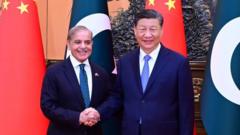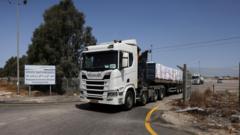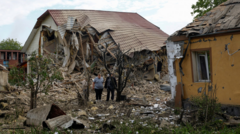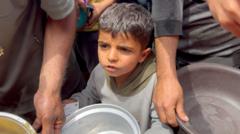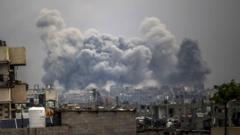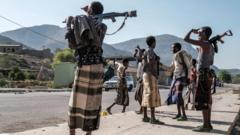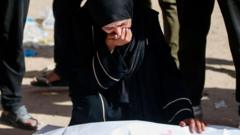The Sudanese army has declared that it has entirely expelled the paramilitary Rapid Support Forces from Khartoum state, marking a significant development amid ongoing civil conflict that has led to widespread devastation in the capital.
Sudan Army Claims Complete Control Over Khartoum State After Expelling Rebels
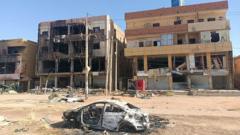
Sudan Army Claims Complete Control Over Khartoum State After Expelling Rebels
Military forces announce the complete expulsion of the Rapid Support Forces from Khartoum state as civil strife continues to plague the region.
The civil war in Sudan, which has raged for two years, reached a pivotal moment as the military announced that the paramilitary Rapid Support Forces (RSF) have been completely pushed out of Khartoum state. "Khartoum State is completely free of rebels," stated the army in a release circulated via Sudan's News Agency. This announcement follows the military's prior success in reclaiming Khartoum city, including key areas such as the presidential palace.
On the same day, renewed fighting erupted between the rival factions in Omdurman, a city also located within the Khartoum state, as the military began a “large-scale offensive” according to reports from AFP. The RSF has yet to respond to the army's assertions regarding their expulsion from the region.
Khartoum was once the center of Sudan's governance, but military leaders have been compelled to relocate to Port Sudan due to the RSF’s dominance. Nonetheless, Port Sudan, previously seen as a bastion of safety, has recently experienced significant violence, including a drone attack earlier this month attributed to the RSF, which the army blamed for causing critical supply shortages and escalating power outages.
The intense conflict has repercussions beyond Sudanese borders, straining relations with the United Arab Emirates (UAE). Sudan accused the UAE of backing the RSF, a claim that the Gulf nation has vehemently denied, labeling it as "unfounded allegations." This tension highlights the complexity of international dynamics surrounding the Sudanese conflict.
Since the outbreak of civil war three years ago, the humanitarian crisis has worsened, with thousands of casualties and millions displaced, making it one of the most severe crises on the globe. Both the military and the RSF face accusations of committing war crimes, which they adamantly reject.
On the same day, renewed fighting erupted between the rival factions in Omdurman, a city also located within the Khartoum state, as the military began a “large-scale offensive” according to reports from AFP. The RSF has yet to respond to the army's assertions regarding their expulsion from the region.
Khartoum was once the center of Sudan's governance, but military leaders have been compelled to relocate to Port Sudan due to the RSF’s dominance. Nonetheless, Port Sudan, previously seen as a bastion of safety, has recently experienced significant violence, including a drone attack earlier this month attributed to the RSF, which the army blamed for causing critical supply shortages and escalating power outages.
The intense conflict has repercussions beyond Sudanese borders, straining relations with the United Arab Emirates (UAE). Sudan accused the UAE of backing the RSF, a claim that the Gulf nation has vehemently denied, labeling it as "unfounded allegations." This tension highlights the complexity of international dynamics surrounding the Sudanese conflict.
Since the outbreak of civil war three years ago, the humanitarian crisis has worsened, with thousands of casualties and millions displaced, making it one of the most severe crises on the globe. Both the military and the RSF face accusations of committing war crimes, which they adamantly reject.







